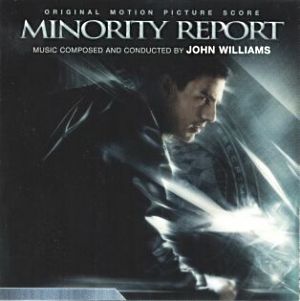John WILLIAMS
Minority Report
OST
DREAMWORKS 0044-50385-2 [73:57]

Director Steven Spielberg watched a number of old film noirs in preparation for this high-concept crime drama. Based on the Philip K. Dick short story and set around the year 2054, the plot centers on a Washington, D.C. "Pre-Crime" cop (Tom Cruise)--member of a special unit that, thanks to three psychics, arrests murderers before they actually kill--who becomes the system's next target. This is a fitting idea for a "dark film." Imagine having to prove your innocence of a crime that has yet to occur. Not coincidentally, Spielberg's liner notes cite the music by John Williams as being "in black and white;" with the exception of some decidedly contemporary techniques and typical Williams moments, this soundtrack exists primarily as an attempt at film noir composition.
Yet with its updated flash, the "black and white" comes across as being more sepia toned, and the action cues are unmistakably colorful. There is quite a bit of underscore searching for a place to go, what Jerry Goldsmith might call "f***ing around music," that Williams seems to equate with mystery. Sometimes it is, but for the most part it is little more than the composer practicing his skills at kaleidoscopic subtlety (which he perhaps exercises a bit too much). In a gimmick that worked better in the conclusion to "Attack of the Clones", the vocalizing of Deborah Dietrich tries to be eerie, but just sounds processed, and in at least one point it clearly is synthesized. Speaking of "Star Wars", listen for the cousin to 'Chase through Coruscant', complete with another "Crouching Tiger, Hidden Dragon" nod... The inclusion of electronica adds little; unlike in the superb "A.I.", with which this score shares some similarities, the synthesizers appear thrown in because they are 'futuristic,' not because they are musico-dramatically appropriate.
Steven Spielberg recently said of the "Minority Report" score, "You feel it more than you hear it." Frankly, I want to hear the music when I listen to it on CD. Thankfully, Spielberg is not altogether accurate. The score's highlights are powerfully pulsating, dynamic. The main theme rarely moves to the foreground, but it radiates classic, cozy warmth while suggesting John Barry's better days. And the frequently discordant action music seems to like bursting suddenly into the sort of rhythmic motifs the maestro is famous for writing. 'Anderton's Great Escape' is one exciting example. Williams also fits in a moment or two for some humorous effects, as 'Eye-Dentiscan' is worth a smile or two.
The album looks nice. In terms of audio, it is mixed unevenly. The extreme lower registers and quieter moments are muffled, and there are moments (such as in 'Leo Crow...The Confrontation') where the sound seems over-processed. At other times, the sound is near-perfect.
"Minority Report" is not one of John Williams' best soundtracks. It may have benefited from a leaner approach. The score is too broad to succeed entirely as a throwback, or even modernization, of noir. Nevertheless, is has the defining elements: the opening track actually includes a dark trumpet solo. Several genuine action cues counter the rather dull drifting selections, and 'Sean's Theme' is a lovely theme to bridge their gap. The movie's tagline, "Everybody Runs", might well refer to all of the Williams buffs rushing to give a listen. It is good.
Jeffrey Wheeler

Ian Lace adds:-
I agree with much that Jeffrey says; although, as in my recent evaluation of Williams’s Star Wars – Attack of the Clones music, I find the calmer stretches are the most rewarding. I must be getting old! This slower, quieter music is intriguingly mysterious, pensive, brooding; speaking, perhaps, of isolation -- the concluding half of the opening title cue that sounds rather like the A.I. Artificial Intelligence music, for instance. Then there is the beauty of ‘Sean’s Theme’…, almost a nocturne for strings and piano; and the lovely, idyllic, ‘A New Beginning’ that concludes the album and contains some of Williams’s most beguiling writing for divided strings.
Practically every score John Williams writes interests the ear and, for the most part, this one is no exception, the sheer skill and imaginative harmonies and colourful orchestration – the unusual percussive effects, for example, impress as always. As Jeffrey remarks this is hardly a black and white score especially in the trenchant and hectic action sequences! ‘Dr Eddie And Miss Van Eych’ (and, to a lesser extent ‘Leo Crow…’) certainly reminds me of Herrmann and Hitch – those tortuous twisting fugal figures at the beginning of ‘Dr Eddie…’ followed by high pitched string atmospherics, so redolent of Psycho, plus deep bass effects, all stir such memories. On the debit side, the use of a female vocalist does not always work this time – there are too many uncomfortable associations with Gladiator for me.
You can argue that there is much that is derivative of Williams’s previous work, (Close Encounters… particularly, comes to my mind). There are such nods in many directions, but as I have observed before, and keep on saying, who cares when such ingredients are used so tastefully, as in this latest of Williams’s recipes.
Ian Lace

Return to Index